 “Very impressive. Though perhaps a bit excessive.”
“Very impressive. Though perhaps a bit excessive.”
–a quote from John Woo’s MANHUNT that I do not believe applies to the movie itself because the concept of excess does not exist in the Woo Zone
 Welcome back to the Woo Zone, a dimension of violence and poetry, of bonding between enemies, of glorious slow motion badassness and tragic desecration of symbols of peace and redemption. When we’re not in the Zone, many of us have resigned ourselves to a world where John Woo is in the past, a face on Action Movie Mount Rushmore, but not a currently active artist. If that’s you, I am honored to bring you word of MANHUNT, Woo’s highly enjoyable new movie which has just been undeservedly sentenced to a Netflix dump in May. I saw it by buying a legitimate region A, English subtitled blu-ray from Yesasia.
Welcome back to the Woo Zone, a dimension of violence and poetry, of bonding between enemies, of glorious slow motion badassness and tragic desecration of symbols of peace and redemption. When we’re not in the Zone, many of us have resigned ourselves to a world where John Woo is in the past, a face on Action Movie Mount Rushmore, but not a currently active artist. If that’s you, I am honored to bring you word of MANHUNT, Woo’s highly enjoyable new movie which has just been undeservedly sentenced to a Netflix dump in May. I saw it by buying a legitimate region A, English subtitled blu-ray from Yesasia.
The hype around this has been that it could be a return-to-form for the maestro, at last returning to contemporary-Hong-Kong-crime-action-male-bonding-with-doves after a detour into Hollywood studio movies (MISSION: IMPOSSIBLE 2, PAYCHECK) and then massive Chinese historical action (RED CLIFF). And that’s pretty much true. There are “good guys” and “bad guys” who gain respect for each other. There are a whole bunch of thrilling action sequences and guns used with artistic license. And I will definitely be telling you some things about the doves. There are some topnotch doves in this one. There’s also some dancing. Because Woo was once a dance instructor.
But Woo – despite throwing in a line of dialogue referencing the title of his breakthrough movie – doesn’t seem primarily interested in making a throwback to his own classics like THE KILLER and HARD BOILED. This is kind of his tribute to Japanese cinema. He made it to show his respect for recently deceased favorite actor Ken Takakura, who inspired Chow Yun-Fat’s style in A BETTER TOMORROW. It’s based on a book by Juko Nishimura that was made into a 1976 movie starring Takakura (not available on U.S. video – whatchya gonna do about that, Netflix?). Though some of the stars are Chinese it takes place in (and was filmed in) Osaka, Japan. (read the rest of this shit…)

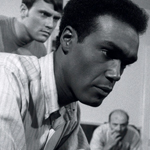 An obscure kind of conspiracy: NIGHT OF THE LIVING DEAD
An obscure kind of conspiracy: NIGHT OF THE LIVING DEAD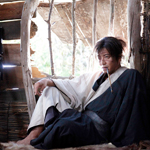 BLADE OF THE IMMORTAL is a 2017 samurai epic from director Takashi Miike. It’s his 100th film! Can you believe that shit? I haven’t gotten into his trademark pervert madman vibe in movies like ICHI THE KILLER, but nothing I’ve seen by him has been a slapdash Fred Olen Ray type affair. There is real effort and craft involved, and he’s made a few excellent samurai films. Instead of remaking an old school chanbara as with
BLADE OF THE IMMORTAL is a 2017 samurai epic from director Takashi Miike. It’s his 100th film! Can you believe that shit? I haven’t gotten into his trademark pervert madman vibe in movies like ICHI THE KILLER, but nothing I’ve seen by him has been a slapdash Fred Olen Ray type affair. There is real effort and craft involved, and he’s made a few excellent samurai films. Instead of remaking an old school chanbara as with  In ANNIHILATION, the sophomore directorial work of Alex Garland (
In ANNIHILATION, the sophomore directorial work of Alex Garland (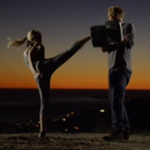 “Are you mental, brov? She just bashed a man’s skull in. It’s a fuckin devil woman, brov! I don’t want none of it!”
“Are you mental, brov? She just bashed a man’s skull in. It’s a fuckin devil woman, brov! I don’t want none of it!”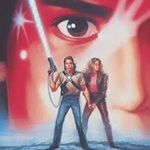 DEADLY WEAPON is another randomly-stumbled-across VHS rental. This one got my attention with a faded lenticular cover and warranted further investigation when I saw that it was written and directed by Michael Miner, the less-discussed co-writer of
DEADLY WEAPON is another randomly-stumbled-across VHS rental. This one got my attention with a faded lenticular cover and warranted further investigation when I saw that it was written and directed by Michael Miner, the less-discussed co-writer of 
 One thing the DEATH WISH remake has in common with the original: it feels kinda disreputable. I went to it knowing it had gotten poor reviews, that it had been delayed, that the trailers had been scoffed at by anybody I ever heard talk about it. People have looked down on Roth’s movies since
One thing the DEATH WISH remake has in common with the original: it feels kinda disreputable. I went to it knowing it had gotten poor reviews, that it had been delayed, that the trailers had been scoffed at by anybody I ever heard talk about it. People have looked down on Roth’s movies since  I spent years trying to be mysterious and ambiguous in an age when everyone was anxious to expose their every pore and playlist online. It was mostly fun and mostly worked well to build an aura around me or something. It was a philosophy, but also a gimmick and a crutch. So I’m glad a few years ago I got an offer I couldn’t turn down that involved appearing in public. It was fun and flattering and inspired me to believe more in what I could accomplish. It changed my mind.
I spent years trying to be mysterious and ambiguous in an age when everyone was anxious to expose their every pore and playlist online. It was mostly fun and mostly worked well to build an aura around me or something. It was a philosophy, but also a gimmick and a crutch. So I’m glad a few years ago I got an offer I couldn’t turn down that involved appearing in public. It was fun and flattering and inspired me to believe more in what I could accomplish. It changed my mind. The Oscars are coming up Sunday. Yes, I know it doesn’t matter who wins, but I enjoy watching the awards and I think they’re a good reflection of the aspirations and values of the people in this business we follow because we love (some of) what they create.
The Oscars are coming up Sunday. Yes, I know it doesn’t matter who wins, but I enjoy watching the awards and I think they’re a good reflection of the aspirations and values of the people in this business we follow because we love (some of) what they create.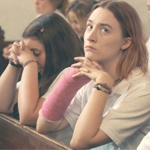 Of all the stories we tell over and over, “coming of age” might be the most universal. I don’t care who you are, as long as you live to be a certain age, at some point you’re gonna come of some of that age. And when you see some fictional (or, let’s be honest, usually semi-autobiographical) character’s age coming of you can compare and contrast to your experiences. You see echoes of your own life, revive emotions that were so potent at the time, now faded, learn about other people who had it different. So I have not specifically experienced being a girl in a private school in Sacramento in the oughts, and I definitely have no personal understanding of how it feels to be someone who could identify a song as Dave Mathews and have an emotional response to it that involves embarrassment, nostalgia and personal meaning*, but I can also see those things on screen and have them feel familiar and real and relatable.
Of all the stories we tell over and over, “coming of age” might be the most universal. I don’t care who you are, as long as you live to be a certain age, at some point you’re gonna come of some of that age. And when you see some fictional (or, let’s be honest, usually semi-autobiographical) character’s age coming of you can compare and contrast to your experiences. You see echoes of your own life, revive emotions that were so potent at the time, now faded, learn about other people who had it different. So I have not specifically experienced being a girl in a private school in Sacramento in the oughts, and I definitely have no personal understanding of how it feels to be someone who could identify a song as Dave Mathews and have an emotional response to it that involves embarrassment, nostalgia and personal meaning*, but I can also see those things on screen and have them feel familiar and real and relatable.























